

 |
FREE THE CHILDREN - Education in Haiti$100,000 will help build schools and rebuild communities.Free The Children's education projects in Haiti help kids like Darlene and her friends stay in school and follow our dreams to be part of rebuilding our country. |
 |
FREE THE CHILDREN - Clean Water and Sanitation in Ecuador$75,000 will help fund water and sanitation projects.Free The Children's water and sanitation projects in Ecuador give Maria and her friends the things they need to stay healthy and in school! |
 |
FREE THE CHILDREN - Environment & Health in Kenya$50,000 will help care for people and nature together.Free The Children's environment and health programs are helping kids like Kananto and his fellow students take care of their communities and the planet so that it is healthy for them and for everyone in the future! |
 |
FREE THE CHILDREN - Alternative Income in India$25,000 will help giving parents an income & children an education.Free The Children's alternative income projects help parents, especially mothers, by giving them different ways of making an income. This also means that kids like Sohan and friends won't have to work and can go to school to get the education they need and deserve. |
 |
Bat Conservation International - Wings Across the Americas: BATS100,000 will help Bat Conservation International raise awareness and increase scientific and public knowledge of migratory bats.Winged migrations across North America are truly extraordinary—but not everyone realizes that BATS join birds and butterflies in transcontinental flight every year. Bat Conservation International is working with the "Wings Across the Americas" project to increase scientific and public knowledge of migratory bats. Online education and outreach will bring bat scientists' fieldwork across the Americas into homes and classrooms around the world. We will be showcasing several bat species (including two endangered species!) that can be found in the USA. For each species we will be completing on-the-ground conservation projects and sharing those stories, presenting up-to-date maps of migration routes and stopovers. As our scientists plot the locations of roosting sites, water and foraging resources along migratory corridors, we will alert the public to the routes of the bats and opportunities for volunteers to lend a helping hand. Bats do a lot to keep fields and forests healthy—and their migratory routes need to be protected so they can travel safely to the north to have their pups and return south when the seasons change. |
 |
Painted Dog Conservation (PDC) — Conservation Clubs and Nature Corners$50,000 will help the Painted Dog Conservation organizing Conservation Clubs in 17 village schools in Zimbabwe.The land near Zimbabwe's Hwange National Park is a harsh region with little rainfall and frequent droughts. While it is home to a great number of animals, including painted dogs, elephants and lions, the trees are over-harvested and wildlife is often poached for food. Painted Dog Conservation (PDC) works to protect the endangered species in this area and also helps people learn to live sustainably in harmony with nature. To enlist young people in this effort, PDC is organizing Conservation Clubs in 17 village schools. These students will learn to grow tree seedlings and use them to reforest their lands. They will fill in eroded gullies with fertile soil, showing their communities how to grow abundant, healthy and organic crops. The Conservation Clubs will build Nature Corners in classrooms with exhibits that share their conservation knowledge with other children. Putting into action the lessons they have learned, Conservation Club members teach adults in their communities how to live in balance with their natural world. |
 |
PATH Foundation Philippines Inc. (PFPI) — Help Young Eco-Warriors Rescue Toby!$25,000 will help children around the world to help the Young Eco-Warriors put a stop to cyanide fishing, which is destroying the fragile coral reef habitat that's home to tropical fish, like the Black-saddled Toby."Rescue Toby!" is the battle cry of the Young Eco-Warrior Movement, which PFPI and partners are working hard to promote. We implore children around the world to help the Young Eco-Warriors put a stop to cyanide fishing, which is destroying the fragile coral reef habitat that's home to tropical fish, like the Black-saddled Toby (left). With support from Disney and kids like you, the Young Eco-Warriors will bring their story from Cuyo Island to other islands in the Philippines and neighboring Indonesia to help children find their voice and speak out against cyanide fishing. Eco-Warriors will also use internet portals to disseminate information to children globally about how demand for aquarium fish is fueling the problem and contributing to destruction of reef habitats. With these simple steps, you too can become an Eco-Warrior! |
 |
Snow Leopard Conservancy — Saving the Ghost-Cat's Snowy Habitat$50,000 will help students in Nepal to protect the habitat of the snow leopard.The snow leopard lives high up on the snowy and rocky slopes of the Himalayan Mountains. Rarely seen by people and never heard (as it cannot roar), this magnificent "ghost-cat" has largely been known by silent tracks left in snow. As people and their livestock have moved into snow leopard habitat, the snow leopard's natural prey has been driven away, and snow leopards have found people's sheep and goats to be an easy and tasty snack. This project will train students in Nepal to help protect both snow leopards and livestock. Students will teach farmers how to build predator-proof corrals to keep their livestock safe. They will also learn to check hidden cameras to track snow leopard activity and help define the corridors that need to be protected to keep snow leopard habitat intact. Most importantly, students will help their communities understand how snow leopards maintain the balance of nature, and why it is important for humans to find ways to live in harmony with wildlife. |
 |
Wildlife Conservation Society — Fiji's Goby Guarantee$25,000 will help Kubulau communities in the Fiji Islands establish new freshwater reserves to protect the habitat of the Goby.My name is Gilbert and I am a goby fish. My family lives in the freshwater rivers of Kubulau, Vanua Levu in the Fiji Islands. I began my life in a stream high up in the mountains of Kubulau, surrounded by thick, tropical forests. As soon as I was born, I began a long journey following the river passage out to the sea. The Wildlife Conservation Society (WCS) plans to develop a comic book, "The Adventures of Gilbert Goby" to tell the story of how I travelled up the river to find my family and all of the dangers (invasive fish, sediment, pollution) that I encountered along the way. WCS plans to share my story with children and adults from Kubulau's 10 villages to teach them how to better manage their freshwater habitats using the "Goby Guarantee", which states that if communities can find many species of gobies in their waterways, they can be assured that their water is clean and plentiful. As a result of the project, WCS will help Kubulau communities establish new freshwater reserves to protect my habitat and designate Goby Youth Ambassadors and Forest Rangers to make sure our rivers stay in good condition. |
 |
African Wildlife Foundation$100,000 will help protect the Endangered Bonobo.The bonobo, which shares 98.4 percent of its genetic makeup with humans, is critically endangered. This fascinating but little understood species is confined to the forest habitat of the Democratic Republic of Congo (DRC) and even more specifically to the left bank of the Congo River. Excessive logging destroys the rainforest and hunting of the bonobo for food, known as "bush meat," is growing in popularity among poachers. The people living in this remote, impoverished area are trying to provide for their families, resulting in the "slash and burn" destruction of the forest for agricultural purposes. The African Wildlife Foundation (AWF) is working to establish the Iyondje Community Bonobo Reserve as a safe haven for the endangered bonobo population. |
 |
Northern Jaguar Project$50,000 will help grow the Jaguar Garden.Jaguars once roamed from Arizona to Argentina, traveling as far north as the Grand Canyon and across much of the southern United States. Today, with a century of illegal killing and habitat destruction, jaguars are endangered - especially along the U.S.-Mexico border. The Northern Jaguar Project, in partnership with Naturalia, have created the Northern Jaguar Reserve where two biologists serve as "jaguar guardians" to protect the local jaguar population and dozens of threatened wildlife species that share the jaguar's home. They work with scientists, keep out poachers, document wildlife and take care of the reserve's lands and waters so that it becomes the best possible habitat for jaguars. Children in nearby rural communities are joining in this conservation effort and will be growing native trees they can plant on the reserve to improve the quality of life for jaguars and all wildlife. |
 |
Fauna and Flora International$50,000 will help tackle Climate Change in Liberia.Fauna and Flora International has been working in Liberia for several years and have recently been approached by a youth group in Northwest Liberia, who want to make and sell fuel efficient stoves for cooking. Aside from being safer, they also use 50 percent less wood- resulting in a safer environment where fewer trees are cut down. In addition, the project will serve as an economic opportunity among the community. |
 |
Proyecto TiTi$25,000 will help recycle Waste Saves Cotton-top Tamarins.Rural communities that surround the last remaining forested areas for endangered cotton-top tamarins live in poverty, and managing waste is an issue of concern given the lack of resources in the region. To reduce the number of trees cut down to create fence posts, Proyecto Titi has developed "Tití Posts", a program that creates posts from recycled plastic waste that would otherwise litter the environment. The Tití Post project is designed to reduce the amount of plastic waste that is littering the environment and creating hazards for both human and wildlife health. The program provides jobs in local communities, collects and reuses the multitude of plastic that is disposed of as litter and helps to create the next generation of environmental entrepreneurs though our Conservation Clubs aimed at teens. |
 |
Mangrove Action Project$25,000 will help the Mangrove Curriculum Adaptation for China.In the past decade, spanning across seven countries, hundreds of teachers and more than 100,000 students have learned about the wonders of tropical mangrove wetlands through exciting hands-on science initiatives. The Mangrove Curriculum Adaptation for China project will expand this program into China teaching children about the importance of coastal mangrove wetlands and how it is critical for achieving long-term conservation. While China has witnessed a slow trend towards better environmental education in regards to water and air pollution issues and the current generation is growing up with little environmental knowledge. Mangrove Action Project will address this issue and help increase awareness through its project. |
 |
BirdLife International - Save Spoony's Wetlands$100,000 will help save Spoony's Chinese wetlands.This project will contribute to the conservation of Spoon-billed Sandpiper, a unique and highly threatened migratory shorebird. It aims to strengthen the protection of the two most important sites known for the species in mainland China, by raising awareness among local government and communities about the importance of the species and of the inter-tidal wetlands that are vital for its survival. Student conservation groups will be established and become the ambassadors for the Spoon-billed Sandpiper, informing local people and the government about the importance of conservation and protecting wildlife. |
 |
The Nature Conservancy - Protecting Canada's Great Bear Rainforest$50,000 will go towards protecting Canada's Great Bear Rainforest.The Nature Conservancy and the First Nation people have teamed up to protect the critically important coastal temperate rainforest through several different initiatives. They have trained local students to study grizzly bears and wolves using remote controlled cameras hidden in the forests and local high school students are working alongside community researchers to monitor local wildlife in their traditional territory. By supporting First Nation-led wildlife monitoring projects and leading a youth program that encourages First Nation kids to take an active role in learning about their traditional territory, the Conservancy and partners are working together to ensure the long-term protection of the rainforest. |
 |
Fauna and Flora International - Iberian Lynx Habitat.$50,000 will aid conservation of the Iberian lynx habitat.Once considered common, the Iberian lynx is now the rarest of all the cat species - with less than 100 cats left. The population crash is due to habitat loss in Spain and Portugal and the dramatic loss of food supply, the rabbit. Ninety-five percent of the rabbit population has been killed by a lethal disease known as myxomatosis. Fauna and Flora International has purchased land and is working to reintroduce the rabbit to help support the lynx. The project will also work with local communities and school children to raise awareness about the Iberian lynx, and the very real chance that it might become extinct forever. |
 |
ECOLIFE Foundation - Going Ape in Cameroon$25,000 will help build a community-based aquaponics system in Cameroon.Rural communities in Cameroon hunt local wildlife, both to eat and to sell - greatly affecting the endangered Cross River gorillas, chimpanzees, and other species in the area. As the human population continues to grow, the demand for this "bush meat" is increasing. The ECOLIFE Foundation, in collaboration with Limbe Wildlife Centre in Cameroon, will build a community-based aquaponics system and educate local people about it as a means to reduce the critical bush meat issues that are devastating forest habitats and the apes that depend on them. Aquaponics is an eco-friendly system for raising fish and vegetables that will improve Cameroonian’s quality of life by providing a sustainable food source, reducing water use for fish farming and vegetable production, and increasing family income, in turn reducing the need and consumption of bush meat. |
 |
Conservation International - Restoring Wetlands in Namaqualand.$25,000 will aid the effort to restore wetlands in Namaqualand.Help restore the freshwater supply for people and wildlife in Namaqualand. This region of South Africa is known for its colorful wildflowers and unique animals like meerkats. The region is also home to 26,000 people who are losing their main water source as livestock overgraze the land and destroy important wetlands. Conservation International is working closely with local communities to help them conserve water by repairing damaged pumps and restoring natural ecosystems, training local volunteers to remove invasive species like poplar trees -- which use up large amounts of ground water -- and replace them with native vegetation. |
 |
Bat Conservation International - Philippines Bats: Extinction and Discovery!$100,000 will help Bat Conservation International raise awareness of biodiversity in the Philippines.The 7,107 islands in the Philippines are home to many animals including 74 bat species, 26 unique to the Philippines. Forty-three percent of bat species on the planet are found in the Asia-Pacific region. The conservation of bats in the Philippines is a crucial and frequently underestimated issue and can be solved by educating and engaging the local people in conservation actions. Bat Conservation International (BCI) will help teachers and students, in the conservation of (bat) biodiversity to raise interest in and awareness of conservation issues in local communities. BCI's model for programming in the Philippines is to engage smaller and often underfunded conservation organizations and offer assistance and professional guidance to local partners. |
 |
The Jane Goodall Institute - Roots and Shoots Shanghai: The Million Trees Project$50,000 will help the Million Tree Project reach its tree-planting goal in Inner Mongolia, China.The Million Tree Project focuses on fighting climate change through planting trees in the deserts of Inner Mongolia, China. Shanghai Roots and Shoots will work with local farmers to help reclaim lost farm land by influencing Chinese citizens to modify their lifestyle habits so it reduces carbon production, and to reclaim their carbon footprint by planting trees. Specifically Roots and Shoots will work to educate farmers and members of the local community, including students, about how to care for young trees and nurseries. The project, now in its third year, has proved to be successful a total of 400,000 trees have been planted more than 90 percent of them have survived the harsh desert conditions, thanks to the local communities care and concern. |
 |
International Fund for Animal Welfare - Clearing the Way for Turtles$50,000 will help the International Fund for Animal Welfare protect sea turtles and their environment.Sea turtles have been around for millions of years, but because of ocean and beach pollution, they could soon be extinct. Discarded plastic bags often end up in the ocean, where sea turtles mistake them for jellyfish - a favorite food. Plastic accounts for nearly 90 percent of all marine debris - a shocking 98.4 tons are floating in oceans worldwide. The International Fund for Animal Welfare (IFAW) will lead a long-term conservation effort that will protect sea turtles and their habitat by cleaning up local beaches, reducing plastic usage overall and educating residents on the means and importance of habitat and species conservation. Local youth will learn about sea turtle conservation and how they can help. They will participate in beach cleanups, where sea turtle eggs hatch, and receive reusable shopping bags for their efforts to help their families reduce plastic bag use. When sea turtles come on shore to lay eggs, scientists will tag the turtles so they can identify and track them. The students will also be able to track the turtles tagged with satellite tags via a website so they can see the direct results of their efforts to protect turtles. |
 |
The Nature Conservancy - Internship Youth Program$25,000 will help the Nature Conservancy connect urban youth with nature.Give kids the chance to protect and restore wildlife! In the past 30 years, children have spent less and less time outdoors. As a result, they don't get as much exercise and they often feel out of touch with nature. The Nature Conservancy's Internship Program for Urban Youth has worked for more than 15 years to help kids connect with nature, providing high school students with the opportunity to leave the city to live, work, and play in the natural world. The Conservancy works with students in four-week periods to protect and restore habitat, plant native trees and save endangered species. The program allows students to earn money, while they learn about careers in conservation and visit colleges. They also, often for the very first time, enjoy outdoor weekend activities like camping, kayaking and swimming. Most students are from underserved urban communities, where activities like these are not always available. Help them connect with nature when you cast your vote! |
 |
Fauna and Flora International - Connecting Classrooms to Global Watershed Management$25,000 will help Fauna and Flora International teach kids about global watershed management.Connecting Classrooms to Global Watershed Management empowers youth to improve the quality of lives across the globe. Through this program youth will learn more about the watersheds they live in and use their findings to provide lasting solutions to pressing water quality issues. Students will visit local rivers or streams with their teachers, be provided with lectures on water management and learn about the factors leading to degradation of water systems. They will collect and analyze their own data from their local rivers and streams and use the data as a basis to protect and improve water resources. The project will also seek to connect educators to outstanding local and international partners to assist with water quality monitoring, classroom support, community connections and events coordination. Results obtained and solutions will be presented to the local administration and students will participate in policy formulation. Students will share results with colleagues from schools abroad. Photos provided by ERUDEF. |
 |
World Wildlife Fund - Communities, Turtles and Climate Change$100,000 will help the World Wildlife Fund protect the leatherback turtles of the eastern Pacific.Leatherback turtles of the eastern Pacific have declined more than 95 percent in the last 25 to 30 years, making it a critically endangered species with fewer than 2,000 nesting females remaining. Junquillal Beach in Costa Rica is among the top five leatherback nesting beaches, averaging about 50 nests a year. However despite these numbers most eggs are being poached- making it near impossible for the species to survive, and for those that do survive, climate change is affecting their nesting grounds and survival rates of the eggs. To help prevent extinction, World Wildlife Fund (WWF) is involving local people to take action. WWF is working with local groups to setup an ecotourism program, helping to illustrate the economic value that turtles can generate. They will also help establish beach patrols, turtle nest monitoring activities and environmental education programs among the local community, and help create strategies to allow the turtle to adapt to climate change. http://www.worldwildlife.org/species/finder/leatherbackturtle/leatherbackturtle.html |
 |
San Bernardino National Forest Association - Children's Forest: Great Seeds Youth Reforestation Project$25,000 will help The Children's Forest Program restore Southern California's San Bernardino National ForestSouthern California's San Bernardino National Forest is one of the busiest forests in the country. Visitors enjoy many activities on this beautiful forest, but this has an impact on the health of our natural resources. With millions of people hiking, biking, and off-roading our forest is being loved to death. The Children's Forest is a program led by youth volunteers who help restore our forest by growing native plants, planting trees, and teaching visitors about how to keep our local National Forest habitats beautiful clean environments for both people and animals to enjoy. |
 |
The Jane Goodall Institute - Roots & Shoots Native Americas Program$50,000 will help the Roots & Shoots Native Americas Program improve the quality of life by providing green, healthy, sustainable solutions.The Pine Ridge Indian Reservation in South Dakota is one of the poorest areas in the United States with an annual per capita income of less than $7,000 (USD). The economic challenges facing this remote corner of the country have resulted in significant environmental degradation. To help address the social and environmental issues afflicting the community, Jane Goodall's Roots & Shoots Native Americas Program is creating clean, green community spaces; promoting healthy, sustainable lifestyles; and working with the residents to preserve, restore, and create natural and cultural resources, like community gardens, on the reservation. While Roots & Shoots staff work with the entire Pine Ridge Indian Reservation population, an emphasis is placed on engaging and empowering elementary and middle-school aged student given the local drop-out rate ranging from 50 to 70 percent. Read Progress Report
|
 |
CHF International - Sunshine for Success$25,000 will help Sunshine for Success build solar panels to provide much needed energy source for children and families.In many rural communities in Colombia, families do not have access to electricity, impacting the quality of life and access to education for tens of thousands of children. Many schools, which normally operate in shifts due to the lack of qualified teachers, are unable to educate all of the children in each community due to the lack of electricity. CHF International will install solar paneling on houses and schools in the Montes de Maria region to meet the needs of children who will now be able to study, play and socialize with their families. In an area that houses more than 140,000 displaced families, due to violence and forced migration, solar electricity will have a two-fold impact. It will prompt families to return home knowing that they have adequate housing and basic services, and it will negate the depletion of forests as tens of thousands of people return to the region, preserving the already fragile ecosystem. |
 |
Algalita Marine Research Foundation - Ship-2-Shore Education Program$50,000 will help the Ship-2-Shore Education Program continue to bring scientists and classrooms together around the world.Around the world, plastic pollution has become a growing problem - clogging waterways, damaging marine ecosystems and entering the marine food web. Much of the plastic trash generated on land flows into the oceans through storm drains and watersheds. Algalita Marine Research Foundation works to protect the marine environment and its watersheds through research, education and restoration. The Ship-2-Shore Education Program is an interactive, web-based tool that links classrooms (K to 12) from around the world via satellite with scientists conducting cutting-edge research on plastic pollution in the world's oceans. While at sea, researchers are in direct daily communication with students in participating classrooms, striving to make students feel a part of the research team and encouraging students to share their insights, suggestions and solutions to plastic pollution. During their virtual voyage, a complimentary standards-based, hands-on curriculum can be downloaded from Algalita's Web site, providing students with grade-appropriate lessons. Using the information gained through these lessons, their interaction with the ships research team, and guidance from a research mentor, students become part of the solution by designing and implementing locally-based projects to address the global problem of plastic marine debris. |
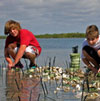 |
The Nature Conservancy - Save Reefs in Mosquito Lagoon, FLA $100,000 contribution will help kids restore oyster reefs by giving the oysters a new place.Help stop oyster reefs from disappearing! Oyster reefs are important because they provide shelter for wildlife, promote clean water, and protect the shoreline. A recent study showed that 85 percent of the world's oyster reefs have already been lost! To save reefs at the Mosquito Lagoon in Florida, we will work with volunteers-including kids like you-to make "oyster mats." The mats restore the reefs by giving the oysters a new place to grow. We'll also educate the community about oysters and let them know what they can do to help http://www.nature.org/wherewework/northamerica/states/florida/misc/art26796.html Launch Video
|
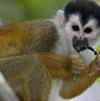 |
Natural Resources Defense Council - Cerro Osa Forest Restoration$50,000 will help Friends of the Osa, to plant thousands of local trees and plants to restore 50 acres of forest land.The Osa Peninsula, located on Costa Rica's southern Pacific coast, is one of the wildest places left in the world. It is home to half of Costa Rica's 500,000 animal and plant species, including many that do not exist anywhere else. The Osa is a critical place for saving animals like the jaguar, squirrel monkey, and peregrine falcon. Unfortunately, this special area is being threatened by expansion of agriculture and other activities. The Natural Resources Defense Council will work with a local group, Friends of the Osa, to plant thousands of local trees and plants to restore 50 acres of forest land. The revived rainforest will once more be the home of unique wildlife and will offer local students a living laboratory to learn about protecting natural resources. http://www.savebiogems.org/costarica/revivearainforest/ Read Progress Report
|
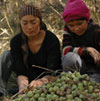 |
Fauna and Flora International - Forest Fruits for the Future$25,000 will educate kids about the implications of using these precious forests.Many people living in the countries of Kyrgyzstan and Tajikistan depend on their forests for survival - fruits and nuts for food to eat, wood for fires and other natural resources to earn an income. Almost all of the people in these communities use the forest with limited knowledge of their impact. This has led to a 90 percent decrease in the size of the fruit and nut forests in Central Asia. Fauna & Flora International's project will educate local community members, kids and young people specifically, through positive and fun activities to increase awareness about the implications of using these precious forests so frequently. With kids help the project will establish eco-youth clubs, tree nurseries and also create conservation plays, poems and dances to change attitudes and behaviour about sustainable forest use. |
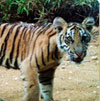 |
World Wildlife Fund - Protecting Indonesia's Tesso Nilo's Habitat$50,000 will help Protect Indonesia's Tesso Nilo's Habitat.Sumatra is the only place in the world where elephants, tigers, rhinos and orangutans live together in the same habitat. In 2004 World Wildlife Fund (WWF) helped create Tesso Nilo National Park on the island of Sumatra as a safe zone for tigers and elephants. WWF will work with the local community to protect this habitat by training local people to patrol the ground-keeping away poachers and minimizing human/animal conflict and will also work to empower local children to care for their wildlife and environment by teaching them how to conserve their resources through several fun, hands-on initiatives. http://www.worldwildlife.org/what/wherewework/borneo/results.html |
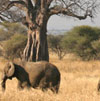 |
African Wildlife Foundation - Communities Give Elephants Room to Roam$25,000 will help to protect the habitats that elephants depend on and the pathways they travel.Elephants are one of the most far-wandering species in all of Africa, traveling great distances in search of food and water. They are very smart and social animals that live in large families and watch closely over one another. Sadly, elephants are often attacked by poachers for their ivory tusks. They are also in trouble because the lands they live on and the paths they travel on are being destroyed. The African Wildlife Foundation (AWF) is working in Zambia to protect the habitats that elephants depend on and the pathways they travel. It is not only elephants that need help though. There are many poor people who live in this area. For that reason, AWF and local villages have agreed to help both elephants and people by protecting a critical elephant path and improving opportunities for local children to go to school. |
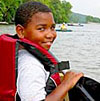 |
National Audubon Society - Pascagoula RiverA $100,000 contribution will help kids keep rivers clean in the United States.Through this program, kids will create cool rain gardens and "living" roofs that filter storm water to keep the Pascagoula River - the last large, free-flowing river in the continental United States - clean for people and wildlife. Even better, the young explorers and scientists who build these water-saving wild places in their schools and communities will post their work online and provide tips to show you how you can protect your local rivers, too! http://www.audubon.org/educate/kids/raingers.html Read Progress Report
|
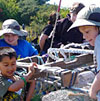 |
Algalita Marine Research Foundation - The Last StrawA $100,000 contribution will help kids promote the reduction of disposable plastic waste on the U.S. West Coast.Help kids promote the reduction of disposable plastic waste! As part of a Youth Summit focused on the impact of plastic trash on the marine environment, youth on the West Coast will be mobilized to prevent plastic waste in coastal habitats and will help launch "The Last Straw," a paddleboard made from 100,000 used plastic straws. |
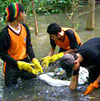 |
Talkin' Trash$50,000 will help kids in Arkansas explore how trash affects our planet.The "Talkin' Trash" program will help kids in Arkansas -- and across the country -- explore how trash affects water, wildlife, and habitat. And then they'll share their experiences through video campaigns and social media to get others to reduce, reuse, and recycle! |
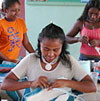 |
Fundacion Proyecto Titi through the Wildlife Conservation Network - Teens, Tamarins and Trash$50,000 will help support local Colombian women's efforts to make cool eco-friendly tote bags.Help local Colombian women make cool eco-friendly tote bags by recycling! Through the "Teens, Tamarins and Trash" program, local kids help protect Colombia's most endangered monkey, the cotton-top tamarin, by collecting and recycling plastic bags, over two million so far, that are then used to make totes, known as eco-mochilas. Read Progress Report
|
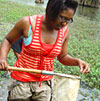 |
Fauna & Flora International in partnership with the Jakarta Green Monster volunteer networkA $25,000 contribution will help keep Indonesia's Angke River clean.Help keep Indonesia's Angke River clean! Through this program kids living in Jakarta can participate in regular weekend workshops. Then they will put their new knowledge to use by volunteering for wetland waste clean-ups and helping to develop community waste-management programs to protect their rivers and wetlands. |
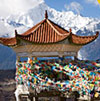 |
The Nature Conservancy - Meili Snow Mountain$25,000 will help spur the effort to keep China's sacred Meili Snow Mountain clean and green.China's sacred Meili Snow Mountain, home to endangered snow leopards and red pandas, is spectacularly beautiful. But tourists are leaving behind a new mountian - made of ugly trash. Before Meili can become a protected national park, this program must help organize community volunteers to keep it clean and green! http://www.nature.org/wherewework/asiapacific/china/work/art13271.html Read Progress Report
|
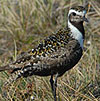 |
Wildlife Conservation Society - Wildlife in the ArcticA $100,000 contribution will help protect arctic wildlife such as polar bears from the effects of climate change.Wildlife in the Arctic is on the front lines of climate change. This program will help increase understanding of how dramatic climate changes are affecting wildlife and will identify key conservation areas in the Arctic that should be protected to ensure the survival of Arctic species, including the polar bear. Plus, the lessons we learn in the Arctic will help us conserve invaluable species in locations throughout the world impacted by climate change! http://www.wcs.org/conservation-challenges/climate-change.aspx Read Progress Report
|
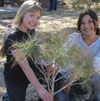 |
San Bernardino National Forest Assn. - Children's Forest in Los Angeles$50,000 will be contributed to the Children's Forest in Los Angeles where kids like yourself will help to plant new trees.It's important to protect the forests of the world's tropical regions. It's important at home, too. With the help of youth volunteers just like you, this program is growing seedlings at a Children's Forest located within an hour's drive of Los Angeles. The forest won't just help absorb carbon - it will also be a place where kids can learn about forest ecology and the importance of forest restoration. http://www.fs.fed.us/r5/sanbernardino Read Progress Report
|
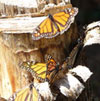 |
Ecolife Foundation - Central Mexico's Oyamel forest$25,000 will go towards helping end deforestation in Central Mexico's Oyamel forest.Stopping deforestation is important. But what do you do when local communities rely on the forest to support their families? This program provides a solution. Central Mexico's ancient Oyamel forests are an endangered forest ecosystem, and the winter home for migrating Monarch butterflies. These forests are also the location for a unique program that provides income to local communities through the construction of fuel-efficient Patsari stoves. Communities are using these stoves instead of open fires, which reduces the need to cut trees, protects butterfly habitat, and keeps their families healthy. But that's not all - for each stove built, fifty trees are planted to bring the forest back to its original splendor! http://www.ecolifefoundation.org Read Progress Report
|
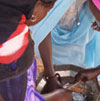 |
CHF International - Green Stoves for Rwanda$25,000 will be donated to help decrease pollution and protect local habitats in Rwanda.In Rwanda, a small country in Africa that is home to one of the world's last remaining populations of endangered mountain gorillas, wood stoves are used to cook food and provide warmth. When trees are cut down for stoves, it not only impacts our climate but also puts the habitat of mountain gorillas at risk. The solution? This program provides special green stoves for families in Rwanda that are quicker, cleaner, and use less fuel. This means fewer trees need to be cut down - good for the people of Rwanda, good for animals, good for trees, and good for our climate! http://www.chfinternational.org/friendsforchange Read Progress Report
|
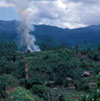 |
BirdLife International and the Haribon Foundation$50,000 will help protect endangered tropical forests in the Philippines.The Philippine Eagle is the largest eagle in the world, with a wingspan of 6.6 feet. Its home is the tropical forests of the Sierra Madre mountain range, the largest old-growth forest cover in the Philippines. How can we protect it? This program manages the forest in a way that generates income for local communities and reforests areas of the Sierra Madre at the same time, protecting habitat for the Philippine Eagle and providing climate benefits for all of us! Read Progress Report
|
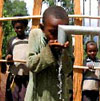 |
CHF International - Safe water in Ethiopia$50,000 will contribute towards improving the collection of safe drinking water in Ethiopia.Families in many parts of Ethiopia do not have enough clean and safe water for drinking, washing their hands, or cooking. To help these families, this program will repair wells so that the water inside is cleaner, build merry-go-rounds in schools that pump fresh water from the ground as they spin, and construct rooftop systems to catch rainwater that families can drink. http://www.chfinternational.org/clickforcleanwater Read Progress Report
|
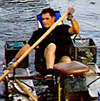 |
Algalita Marine Research Foundation - Plastics are Forever$50,000 will help create educational programs about watershed conservation in the U.S.Watersheds are important, but what are they? They're areas of land where all of the water drains into the same river or lake. This program will build upon Dr. Marcus Eriksen's trip down the Mississippi River in a boat made out of 232 2-liter plastic bottles, an old car seat and two bicycles by creating educational programs for school children about watershed conservation. The program will also establish Plastics are Forever recycling projects in communities stretching from Minnesota to Louisiana, helping inspire the next generation of watershed leaders to keep the Mississippi clean! http://www.plasticsareforever.org Read Progress Report
|
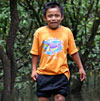 |
Fauna & Flora InternationalA $25,000 contribution will help reduce pollution in Brazil's lagoons and rivers.This program will help reduce water pollution in the rivers and lagoons of the Amazon Rainforest in Brazil. This pollution is very dangerous because local people are eating the poisoned fish that live in the rivers, which is making them sick. The program will build a plan that can decrease the pollution problem and help local people learn about health threats from eating contaminated fish. http://www.fauna-flora.org/news_disney_brazil.php Read Progress Report
|
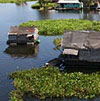 |
Conservation International - Tonle Sap LakeA $25,000 contribution will help encourage freshwater protection in Cambodia.This program will improve the lives of the people and animals - like hairy-nosed otters and fishing cats - that live on, in or near Tonle Sap Lake in Cambodia. Nearly three million people rely on the Tonle Sap for freshwater and food, but the water is dirty because people are cutting down the flooded forests that keep it clean. This program will make local people partners in the protection of the lake, by encouraging them to protect the forests so people get clean water and more food, and wildlife gets a place to live! http://www.conservation.org/freshwater Read Progress Report
|





